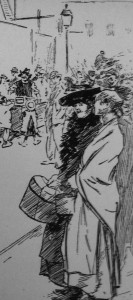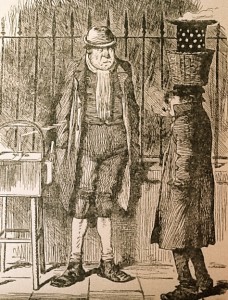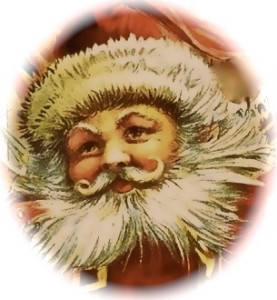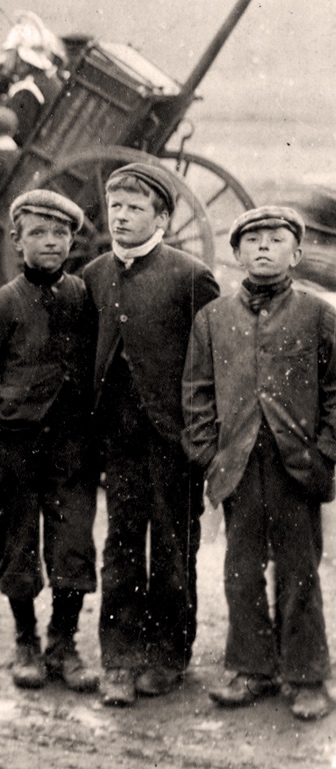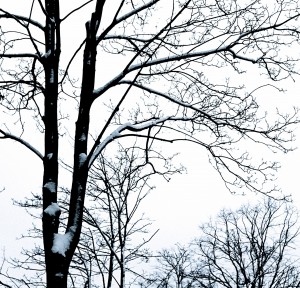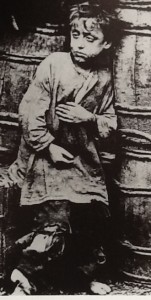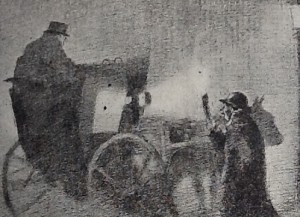Christmas Shopping. London 1860
An extract taken from “For Every Lie” by J E Seaward
‘Violet, I have to do some Christmas shopping, why don’t you come? The shop windows are bursting with beautiful things, sparkling silver and china…’
‘What would I want with all that stuff?’ Violet raised her eyes to the ceiling and continued measuring flour into a large mixing bowl.
‘Sweets and candied fruit in beautiful boxes,’ Mary coaxed, ‘even you would like those – and you can see the Christmas tree in Mme Goosen’s window. It’s covered in silk flowers, lace and ribbon from her shop and lit up with gold candles. You must think that’s worth a look?’
‘The Atkinsons’ would have a fit if they saw us sauntering off, neglecting our duties.’
‘They’re not here!’ Mary shrugged her shoulders in protest, but the pleading twinkle in her eyes melted Violet’s heart.
‘What a soft touch you must think I am!’ complained Violet, concealing her amusement.
‘Well my concern is for you, Mrs K, having to wait another whole year before getting the chance again. You can listen to the church singers and yesterday, when I went to the post office, I saw a banner saying there’s going to be a Punch and Judy show. Let’s put on our diamonds and fur stoles and grace King Street with our honourable presence!
‘Heavens almighty girl! How much time do you think I can waste in one day?’ Violet could no longer contain her smile. Mary knew the battle was won and she ran upstairs to fetch her coat, reappearing bundled in enough layers to protect her from the coldest weather. While Violet got herself ready, Mary took a spade from the garden store and scraped the ice away from the steep kitchen steps.
During their walk up to King Street, arm in arm with their baskets swinging, they were overtaken by a fit of mirth and childish feelings of excitement for Christmas. Violet’s description of a scarf that she’d knitted for her husband made them howl with laughter. The shop windows and Christmas slogans could have easily tempted them to lose all their savings so they had to be strict and leave money in their purses for other things. Once their presents, paper and coloured string were bought and the Christmas sights fully taken in, they treated themselves to a hot cup of sweet coffee from a stall. They stood watching the world go by in all its very best humour; rubbing shoulders with the poor and the rich, the plain and the beautiful, the happy and the sad alike.
Before returning to St Peter’s Road, Violet bought a bag of chestnuts and two crispy skinned potatoes from a street vendor for their lunch. The smell of the chestnuts roasting on hot coals had been enticing them all morning.
‘We’ll have a bit of ham and pickles with those,’ said Violet.
_______________________
My love of Christmas shopping started as a small child with the yearly trip to visit Uncle Holly in Selfridges, followed by an exciting visit to the Harrods toy department. This was not to buy… just to look, marvel, and sometimes touch the wonderful toys that would definitely not end up in our Christmas pillowcases. They were generally, and predictably, filled with a new satchel – or shoes, a comic Annual and new vests and pants.
There would be a couple of satsumas and an envelope containing a one pound note from great Aunty Ivy which, over many years, never went up with inflation. Grandma knitted us each a size-too-big school jumper and finally, the obligatory Cadbury’s selection box. Every year, without fail, I managed to finish the lot before the Queen’s speech and throw up. My Christmas lunch went down the pan with it!
I loved the smell of the Christmas tree, mince pies, turkey roasting with all the trimmings and sherry sipped illicitly from grown-up’s glasses.
A Victorian Winter, London 1860
Extract taken from “For Every Lie” by J E Seaward
The horrors of a cold Victorian winter did not immediately touch the Atkinsons and the better-off classes in Hammersmith, nor even Mary herself. She had the protection of a warm kitchen, food in her stomach and clothes on her back. She had a better life than many, but she also had first hand knowledge of poverty – it was all around her. There was her own mother working long, hard hours at the laundry for little pay. Her mother’s landlord had callously threatened to throw her out when she’d complained about the leaking roof, saying there were many who would pay double for such a dwelling.
Dire poverty, hunger and crime were thrust in Mary’s face on her daily shopping trips to King Street. She saw a whole family begging, sitting among refuse from the shops to keep themselves warm and dependent on donations from passers by before being able to buy a loaf of bread or a cup of tea. Ragged, dirty-faced children, as young as three or four, approached strangers to try and sell any small thing they had stolen or found on the streets. Some would offer wood or rope they’d gleaned from the riverbed at low tide – anything, from a lump of coal to a lace-edged handkerchief.
Some mornings, shop windows were boarded up after being smashed by looters during the night. This prompted many shopkeepers to install iron grilles over their windows – like prison bars, reminding everyone of the consequence of crime. The only windows that were never broken belonged to the undertaker’s. The rate of death doubled in a harsh winter and death was a profitable line of business. Each clothing shop displayed the latest styles for mourning along with winter tweeds and furs. Jewellers took their jet and diamond mourning brooches from under the counter and put them on full view. Even the rich were not protected from death; it was just more dignified.
The worst thing that Mary saw during that winter was the naked corpse of a young boy, wrapped in rags and newspaper. It had been left in an alley beside Mme Goosen’s shop. His stomach was distended with malnutrition and his skin was filthy and covered with sores. The police had been called and they were unwrapping the body as Mary came out of the shop. There were a few onlookers trying to give reason to the tragedy.
‘Must be starvation – dear God, look at the state of him!’
‘But why leave the poor little devil naked, all alone?’
‘Couldn’t afford the funeral, I shouldn’t wonder.’ An undertaker’s cart came and the police moved the crowd aside.
‘Move away, ladies and gents, get about your business. He’s with his Maker now. No more to gawp at.’ It made Mary feel deeply sad. The boy had looked about her brother’s age and she could think of nothing else that day and he came into her dreams for many nights after that.
__________________
The Victorians lived in a an unfair society of rich and poor. There was a middle class but not many people were able to aspire to it once poverty had set in. This situation grew worse throughout the Victorian era – even craftsmen were poorly paid and lived a relatively plain life. Britain was conquering the world and technology was beginning to move forward – but people were still dying from poverty. Children were starving, and there was no where to turn except to take charity from the church and, the final degradation… the workhouse. There were other options if you were really desperate; crime and prostitution.
There was no national health, social security or council housing and landlords took good rent for appalling accommodation. Slums bred disease, and sick people couldn’t work. Despite the incredible improvements in social and healthcare provisions, there are still parts of our society, let alone the rest of the World, that struggle beyond most of our imaginations.

